

Home - Drama Online. 10 Contemporary British Playwrights You Should Know. Shakespeare Resources. ComedyTragedyCharacteristics. Send a Script FAQs - Writers Room. Send a Script FAQs - Writers Room. Fact Sheet How to Write and Present your Script. Y3Resources for Script Writing. Shakespeare's Plays. Shakespeare's Plays Before the publication of the First Folio in 1623, nineteen of the thirty-seven plays in Shakespeare's canon had appeared in quarto format.
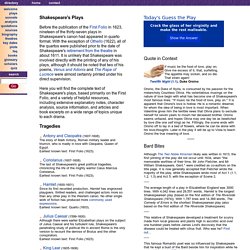
With the exception of Othello (1622), all of the quartos were published prior to the date of Shakespeare's retirement from the theatre in about 1611. Harold Pinter (1930 - ) The son of a Jewish tailor, Harold Pinter was born in East London in 1930.
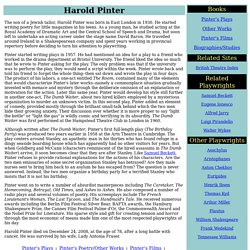
He started writing poetry for little magazines in his teens. As a young man, he studied acting at the Royal Academy of Dramatic Art and the Central School of Speech and Drama, but soon left to undertake an acting career under the stage name David Baron. He travelled around Ireland in a Shakespearean company and spent years working in provincial repertory before deciding to turn his attention to playwriting. Pinter started writing plays in 1957. He had mentioned an idea for a play to a friend who worked in the drama department at Bristol University. Samuel Beckett (1906-1989) Samuel Beckett was born on Good Friday, April 13, 1906, near Dublin, Ireland.
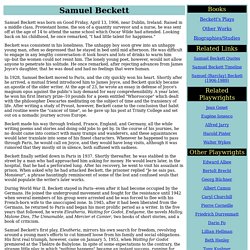
Luigi Pirandello (1867 - 1936) Luigi Pirandello was born in 1867 in Girgenti (now Agrigento) on the island of Sicily.
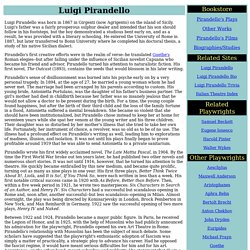
Luigi's father was a fairly prosperous sulphur dealer and intended that his son should follow in his footsteps, but the boy demonstrated a studious bent early on, and as a result, he was provided with a literary schooling. He entered the University of Rome in 1887, but later transferred to Bonn University where he completed his doctoral thesis, a study of his native Sicilian dialect. Pirandello's first creative efforts were in the realm of verse--he translated Goethe's Roman elegies--but after falling under the influence of Sicilian novelist Capuana who became his friend and advisor, Pirandello turned his attention to naturalistic fiction.
His first novel, The Outcast (1893), contains the seeds that would blossom in his later writing. Pirandello's sense of disillusionment was burned into his psyche early on by a very personal tragedy. Friedrich Dürrenmatt (1921-1990) Born on January 5, 1921, in Konolfingen, Switzerland, Friedrich Dürrenmatt already had writing in his blood.
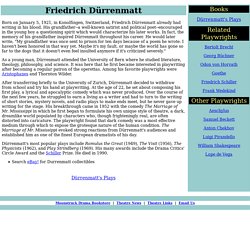
His grandfather--a well-known satirist and political poet--encouraged in the young boy a questioning spirit which would characterize his later works. In fact, the memory of his grandfather inspired Dürrenmatt throughout his career. He would later write, "My grandfather was once sent to prison for ten days because of a poem he wrote. I haven't been honored in that way yet. Maybe it's my fault, or maybe the world has gone so far to the dogs that it doesn't even feel insulted anymore if it's criticized severely. " Tom Stoppard (1937 - ) Tom Stoppard was born "Tom Straussler" in Zlin, Czechoslovakia on July 3, 1937.
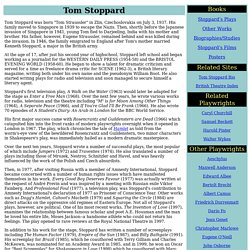
His family moved to Singapore in 1939 to escape the Nazis. Then, shortly before the Japanese invasion of Singapore in 1941, young Tom fled to Darjeeling, India with his mother and brother. John Osborne (1929-1994) Born on December 12, 1929, in London, John Osborne would eventually change the face of British theatre.
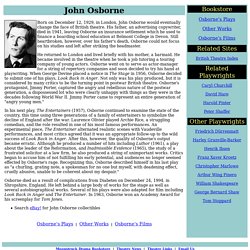
His father, an advertising copywriter, died in 1941, leaving Osborne an insurance settlement which he used to finance a boarding school education at Belmont College in Devon. Still heartbroken, however, over his father's death, Osborne could not focus on his studies and left after striking the headmaster. He returned to London and lived briefly with his mother, a barmaid. He became involved in the theatre when he took a job tutoring a touring company of young actors. Osborne went on to serve as actor-manager for a string of repertory companies and soon decided to try his hand at playwriting. David Hare (1947- ) Born June 5, 1947 in St.
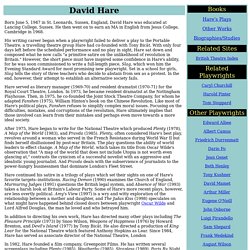
Leonards, Sussex, England, David Hare was educated at Lancing College, Sussex. He then went on to earn an MA in English from Jesus College, Cambridge in 1968. His writing career began when a playwright failed to deliver a play to the Portable Theatre, a travelling theatre group Hare had co-founded with Tony Bicât. With only four days left before the scheduled performance and no play in sight, Hare sat down and composed what he now calls "a primitive satire on the unlikelihood of revolution in Britain. " The WWW Virtual Library for Theatre and Drama.
Screenplays. Play scripts online: ProPlay. Arnold Wesker - Theatre Archive Project - Arts, literature and performance. David Storey. Caring Synopsis: Notes: 1st Produced: Company: 1st Published:
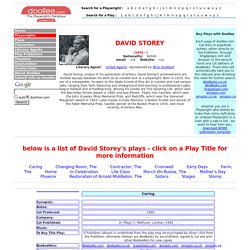
The Art of Theater No. 7, Tom Stoppard. Tom Stoppard, ca. 1980 At the time of this interview, Stoppard was near the end of rehearsals for his new play, Hapgood, which opened in London in March, 1988.
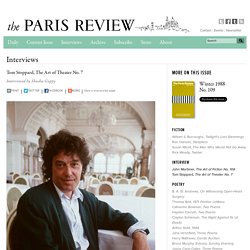
For the duration of the rehearsals Stoppard had rented a furnished apartment in central London in order to avoid commuting, and although he had said, “I would never volunteer to talk about my work and myself more than ninety seconds,” he was extremely generous with his time and attention. J. B. Priestley. John Boynton Priestley, the only child of Jonathan Priestley (1868–1924), and his first wife, Emma Holt (1865–1896), was born in Manningham, a suburb of Bradford on 13th September, 1894. Despite being the son of an illiterate mill worker, his father became a school teacher.
His mother died when he was only two years old and in in 1898 his father married Amy Fletcher, whom Priestley described as a loving stepmother. Priestley was educated at Whetley Lane Primary School, and then, on a scholarship, Belle Vue High School. Bored with school he left education and the age of sixteen and found work as a clerk for a wool firm in Bradford. He joined the Labour Party and began writing a column in their weekly newspaper, The Bradford Pioneer. On the outbreak of the First World War Priestley immediately joined the British Army.
Priestley was sent to France and served on the Western Front. Alan Plater radio plays - DIVERSITY WEBSITE. The smokeless zone 1961 counting the legs 1961 the mating season 1962 the rainbow machine 1962 the seventh day of arthur 1963 excursion 1965 ted's cathedral (from stage play)1965 the northern drift (as editor)1965/8 BBC north the what on the landing? *1967 fred (from tv play) 1970 close the coalhouse door* (from the stage play) 1972 the slow stain (for brighton festival)1973 5 days in '55 (the gilberdyke diaries) 1976 Curriculee Curricula 1978 (jt. stereo on BBC2 TV and Radio 4) and a little love besides* 1979 tunes 1979 swallows on the water (from stage play) 1981 the journal of Vasilije Bogdanovic* 1982 WService tolpuddle* 1982 skyhooks* (from stage play) 1983 who's jimmy dickenson? 3 plays from the north, play 1:see the pretty lights*,date nk, 30m. *exist in collections within VRPCC. Harold Pinter.
Osborne, John (1929-1994) Biography. With his 1956 play Look Back in Anger, John Osborne famously kick-started the theatrical trend for 'Angry Young Men' and drama that put society's discontents at centre-stage. Although primarily known as a playwright, Osborne (born on 12 December 1929 in Fulham, London) also made significant contributions to British film and television. Both Look Back in Anger and the 1957 play The Entertainer were filmed by their stage director, Tony Richardson (1959 and 1960).
They were produced by Woodfall Films, a company founded by Osborne and Richardson when they failed to secure funding for the first film. These and much of Osborne's subsequent stage work have also been produced for television. BBC - BBC Four - Audio Interviews - Michael Frayn. Born in London, Frayn was educated at Cambridge. After graduation, he worked as a journalist for the Guardian and the Observer, becoming well known as a witty and sharply satirical columnist. In 1970, his first play, The Two of Us, was staged in London's West End. A brilliant satirist, Frayn has made use of his journalistic background, notably in Alphabetical Order (1975), a play set in the cuttings library of a provincial newspaper.
Comedy - Ben Elton Profile. David Edgar - Literature. ‘Drama confronts our private dreams and agonies with the public rituals designed to mark and come to terms with them’, David Edgar has observed in How Plays Work (2003). The interplay between private life and public life is indeed one of the abiding themes of his works. In the preface to this wide-ranging guide to the mechanisms and techniques of drama, David Edgar describes the origins of the book in the playwriting workshops and courses he ran at Birmingham University from the mid-1970s to 1999, which focused on dramatic problems that ‘can be collectively explored and individually applied’. Nell Dunn: I never used to think about death, until I was 50. I was never going to die. I was immortal. But now I think about death every day. Noel Coward 101. Compiled by John Kenrick. Bolt, Robert (1924-1995) Biography. Blake Morrison salutes Alan Bennett as the writer approaches his 75th birthday.
Birthdays were never made much of in Alan Bennett's family. JMBarrie.co.uk - Introduction. If this is your first visit, welcome to jmbarrie.co.uk. The new introduction to the Yale edition of J M Barrie & the Lost Boys attempts to put the website in some sort of context, and if you’ve not already read it and would like to do so, carry on reading. Otherwise to skip the Yale Introduction and go straight to the Website Introduction. This will hopefully allow some future writer to plough the same field and come up with a different perspective than mine. Alan Ayckbourn's Official Website. Open Source Shakespeare: search Shakespeare's works, read the texts.
Equus (play) Equus is a play by Peter Shaffer written in 1973, telling the story of a psychiatrist who attempts to treat a young man who has a pathological religious fascination with horses.[1] Shaffer was inspired to write Equus when he heard of a crime involving a 17-year-old who blinded six horses in a small town near Suffolk.[2] He set out to construct a fictional account of what might have caused the incident, without knowing any of the details of the crime. Terencerattigan. Terence Rattigan is one of Britain’s greatest playwrights. He was born on the 10th June 1911 and educated at Harrow (Scholar) from 1925 to 1930 and Trinity College, Oxford (History Scholarship) BA to 1933. The Official Dennis Potter Home Page. Edward Albee - Playwright. Synopsis Edward Albee (born March 12, 1928) turned to playwriting in the 1950s. His early popular one-acts, including The Zoo Story (1959), established him as a critic of American values.
Brian Clemens obituary. Award-winning author, screenwriter and producer.